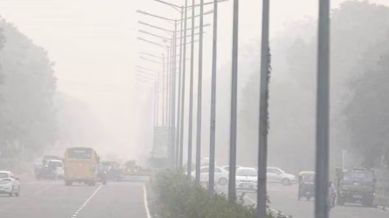Stay updated with the latest - Click here to follow us on Instagram
Chandigarh: Joint teams of CPCC, traffic police, transport department to begin vehicle emission checks
To tighten enforcement, the AQMC also called for strict implementation of the firecracker ban during festivals and rigorous compliance with the Construction and Demolition Waste Management Policy, 2022

Joint teams of the Chandigarh Pollution Control Committee (CPCC), Traffic Police and the Transport Department will soon begin extensive vehicle emission checks, covering both government and commercial fleets, as part of a citywide push to curb air pollution before the winter and festive season.
The move comes alongside a pilot project on dust control and a series of strict directives issued during the 10th meeting of the Air Quality Monitoring Committee (AQMC), chaired by director (environment) Saurabh Kumar.
The AQMC reviewed the preparedness of stakeholder departments for the coming season, a period when the city’s air quality often slips to “poor” or “severe.” Kumar voiced concern over the slow pace of earlier directives and urged urgent, coordinated action under the National Clean Air Programme (NCAP).
A pilot project will soon be launched on one of Chandigarh’s dust-prone corridors, featuring road washing with treated water, mechanised sweeping, and shoulder cleaning. The CPCC will monitor PM10 levels during the trial and prepare recommendations for scaling up the initiative across the city.
The Municipal Corporation was asked to expedite pending proposals for an Integrated Traffic Management System in consultation with the Traffic Police and to install air pollution control devices at crematoriums. Alongside, the MC and the Department of Forests and Wildlife were tasked with identifying sites for high-density Miyawaki plantations and creating a thick green buffer around the city’s dumping ground to mitigate its environmental and visual impact.
The chairman directed that NCAP funds allocated for 2024–25 must be fully utilised by September 30, 2025. Failure to do so will result in the withholding of next year’s allocation. The MC, which has already received ₹7.92 crore each in the last two financial years, was asked to fast-track projects and submit utilisation certificates within five working days.
To tighten enforcement, the AQMC also called for strict implementation of the firecracker ban during festivals and rigorous compliance with the Construction and Demolition Waste Management Policy, 2022. The Traffic Police will prepare a festive-season traffic management plan, while the State Transport Authority will conduct special audits of Pollution Under Control (PUC) centres.
Meanwhile, the CPCC has issued directions under Section 31-A of the Air (Prevention and Control of Pollution) Act, 1981, to several institutions and agencies — including PGIMER, Panjab University, PEC, the Railways, Steel Authority of India, Tata Steels, Rashtriya Ispat Nigam Limited, and Verma Transport Company — requiring them to adopt precautionary measures. These include dust suppression at stockyards, covering loose soil with vegetation, and effective use of anti-smog guns and sprinklers. Non-compliance will invite environmental compensation and punitive action.
The meeting concluded with a call for a citywide awareness campaign. Departments were asked to prepare information, education and communication (IEC) plans within 15 days, targeting schools, residents’ welfare associations, markets, transporters, and builders through radio jingles, street plays, workshops, and outreach drives.
“Clean air cannot be achieved through seasonal responses. What we need is year-round, sustained commitment with strong community engagement and administrative accountability,” said Saurabh Kumar, directing all departments to submit monthly compliance reports to the CPCC.